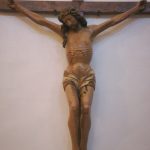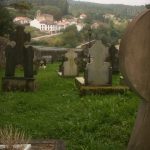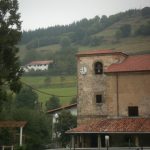 As I mentioned earlier, a couple of weeks ago, I spent a week in Munitibar, the town my dad grew up in and where his brother runs the Herriko Taberna.
As I mentioned earlier, a couple of weeks ago, I spent a week in Munitibar, the town my dad grew up in and where his brother runs the Herriko Taberna.
During that week, something like three people died, including the oldest resident of the town (who was 98). Of course, for each, there was a mass. There was also an anniversary mass for maybe another couple of people who had died the year before (I wasn’t quite clear how many people the anniversary mass was for and how many had died that week).
In any case, to me, the most interesting part wasn’t the mass, but the aftershock, if y ou will. The town has maybe 500 residents (though, with the sudden boom in apartments, that is maybe growing). For the last mass, the anniversary mass, maybe 300 people attended. The other masses also drew large numbers of people. What was most interesting was the life in the plaza, in the bars, afterwards. The funerals brought everyone together, some who hadn’t seen each other in quite some time, family who had moved to the big city. They used the opportunity for family reunions, big lunches in the plaza
ou will. The town has maybe 500 residents (though, with the sudden boom in apartments, that is maybe growing). For the last mass, the anniversary mass, maybe 300 people attended. The other masses also drew large numbers of people. What was most interesting was the life in the plaza, in the bars, afterwards. The funerals brought everyone together, some who hadn’t seen each other in quite some time, family who had moved to the big city. They used the opportunity for family reunions, big lunches in the plaza , time to catch up with everyone. They wandered the town, txikiteando, just soaking in life. The way of life simply lends itself to this type of celebration, with the numerous bars and the habit of going from one to the other, having just a small drink at each, chatting with whomever you find.
, time to catch up with everyone. They wandered the town, txikiteando, just soaking in life. The way of life simply lends itself to this type of celebration, with the numerous bars and the habit of going from one to the other, having just a small drink at each, chatting with whomever you find.
From the death of their neighbors, their family members, they came together to celebrate life. It was amazing to watch the entire town simply be a community, be there for one another. In some sense, the funerals were more than a goodbye to the people who died, they were also an opportunity for the town to be a community.
Discover more from Buber's Basque Page
Subscribe to get the latest posts sent to your email.


Do you think generations have to remain in the same area for this sense of community to be nurtured or is it a function of the structure of the town around a plaza with bars? Perhaps it is simply the Basque way….
This is a litle bit like some of Robert Laxalt’s writing about Iparralde. One Hundred Graves is one of our favorite books. The sentiment is very reminiscent, although the particulars and the tone of the writing differ. I think if Laxalt were around today he would very much approve of this web site, Blas!
Good question, Lisa. I think it is partially the structure of the town and the way of life, with socializing by wandering the bars being such a big part of things there. It just makes it so that people know each other more and that the community is tighter. People are running into each other all the time in the bars. But, as things change, as people move to other towns, and as immigrants from other parts of Europe move there, who knows what will happen.
Dafydd, thanks for the great compliment. I greatly appreciate it!
Munitibar is also my father’s home town. In 2003 my Aitxitxe in Munitibar died at the ripe old age of 95 as we were en route to visit. Following the Mass we actually walked directly next door to Bar Txori where the priest invited us to a “trago” . Amongst the many things we spoke of the most memorable to me was the differences between the Catholic Church in Euskadi and the Church in America. I told him that I certainly would never expect to go to a bar after Mass with a priest in the US…In my experience, in Euskadi (as in many places) there is a greater sense of community in general. People live closer. You know your neighbors. For recreation you leave you home, not invite people to it, so you are typically meeting socially in bars, restaurants, the plaza, etc…In a town like Munitibar where there is only one plaza and a Church at the center, your focal point is naturally there. Word travels fast and if by some miracle you don’t know (and this is truly an impossibility) the ring of the bell for Mass is unmistakable and is always a good reason to congregate.
From my experience in Euskadi